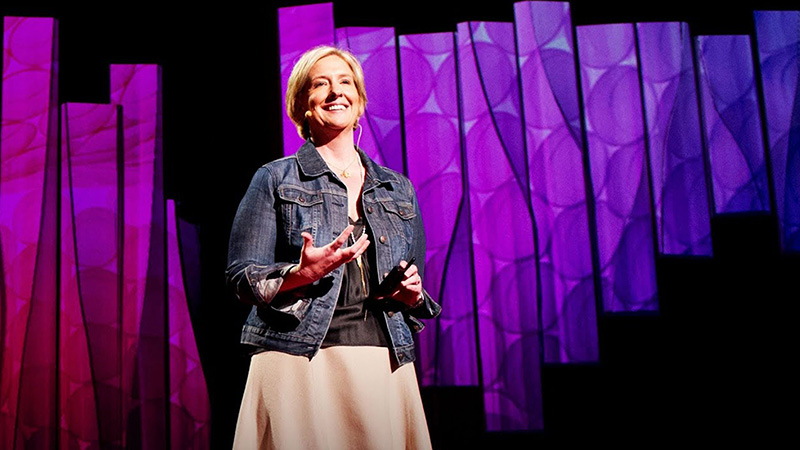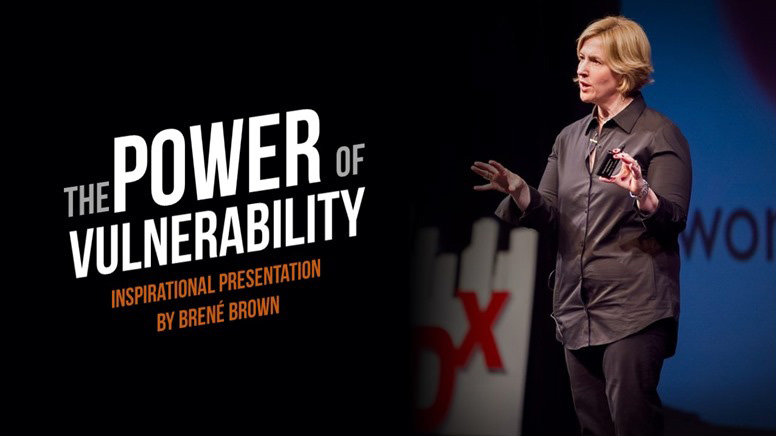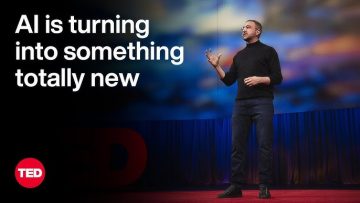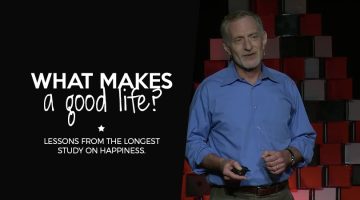布琳.布朗TED演讲:The power of vulnerability
Brené Brown《布琳·布朗》是一名社会工作者和研究人员,她的研究领域主要涉及人类情感,包括勇气、脆弱性、耐心和亲密关系。其TED演讲《The Power of Vulnerability》是一场非常著名的演讲,目前在TED官网观看次数超过2000万,演讲中她深入探讨了脆弱性(Vulnerability)的概念以及它在我们生活中的重要性。在这场TED演讲中,她分享了她在多年的研究中所得出的一些深刻洞察。

Brené Brown’s TED Talk, titled “The Power of Vulnerability,” is a compelling exploration of human emotions and the remarkable strength that can be found in embracing our vulnerabilities. In this thought-provoking speech, Brown, a renowned social worker and researcher, delves deep into the concept of vulnerability, challenging the conventional view that it represents weakness. Instead, she passionately argues that vulnerability is a source of profound courage and resilience.
With engaging storytelling, humor, and genuine heartfelt insights, Brown shares her extensive research and personal experiences to underscore the importance of authenticity and opening ourselves up to the world. She makes a compelling case for the idea that it’s only when we dare to be vulnerable, allowing ourselves to be seen, and connecting with others through our shared humanity, that we can foster genuine relationships, nurture bravery, and achieve personal growth.
Brené Brown’s “The Power of Vulnerability” has resonated with audiences worldwide, encouraging individuals to reevaluate their perspectives on vulnerability and inspiring them to embrace it as a catalyst for meaningful connections and personal transformation. This TED Talk is a powerful reminder of the strength that comes from acknowledging our vulnerabilities and is a must-watch for anyone seeking a deeper understanding of the human experience.
以下是这场演讲的简要介绍:
布琳·布朗是一名社会工作者和研究人员,她的研究领域主要涉及人类情感,包括勇气、脆弱性、耐心和亲密关系。在这场TED演讲中,她分享了她在多年的研究中所得出的一些深刻洞察。
演讲的主题是探讨脆弱性,她认为,许多人将脆弱性视为一种弱点,但她坚信它实际上是一种强大的力量。她强调了坦诚面对自己的脆弱性以及与他人分享真实情感的重要性。她认为,只有在我们允许自己脆弱的时候,我们才能真正建立深厚的人际关系、培养勇气并实现成长。
布琳·布朗的演讲以她个人的故事、幽默和深情的方式展示了这些观点,她的演讲风格引人入胜。这场演讲在TED平台上备受欢迎,深刻触动了许多人,让人们重新思考了脆弱性在生活中的作用。这个演讲对于那些希望更好地理解和接纳自己的人来说,是一个强烈的启发和鼓励。

以下为《绝学社》为大家整理的布琳.布朗TED演讲稿:
1–So, I’ll start with this: a couple years ago, an event planner called me
2–because I was going to do a speaking event.
3–And she called, and she said,
4–“I’m really struggling with how to write about you on the little flyer.”
5–And I thought, “Well, what’s the struggle?”
6–And she said, “Well, I saw you speak,
7–and I’m going to call you a researcher, I think,
8–but I’m afraid if I call you a researcher, no one will come,
9–because they’ll think you’re boring and irrelevant.”
10–And I was like, “Okay.”
11–And she said, “But the thing I liked about your talk
12–is you’re a storyteller.
13–So I think what I’ll do is just call you a storyteller.”
14–And of course, the academic, insecure part of me (搞科研人员的严谨意识让她很难将自己的演讲与一名讲故事的人混为一谈,因为故事可以千奇百怪,但科研主打求真、严谨。)
15–was like, “You’re going to call me a what?”
16–And she said, “I’m going to call you a storyteller.”
17–And I was like, “Why not ‘magic pixie’?”
a fictional character often associated with folklore and fantasy literature. These creatures are typically tiny, magical, and mischievous, and they may possess the power to cast spells, perform tricks, or bring good fortune.(魔法小精灵)
18–I was like, “Let me think about this for a second.”
19–I tried to call deep on my courage.
20–And I thought, you know, I am a storyteller.
21–I’m a qualitative researcher.
22–I collect stories; that’s what I do.
23–And maybe stories are just data with a soul.
24–And maybe I’m just a storyteller.
25–And so I said, “You know what?
26–Why don’t you just say I’m a researcher-storyteller.”
27–And she went, “Ha ha. There’s no such thing.”
28–So I’m a researcher-storyteller, and I’m going to talk to you today —
29–we’re talking about expanding perception —
30–and so I want to talk to you and tell some stories
31–about a piece of my research that fundamentally expanded my perception
32–and really actually changed the way that I live and love
33–and work and parent.
34–And this is where my story starts.
35–When I was a young researcher, doctoral student,
36–my first year, I had a research professor who said to us,
37–“Here’s the thing, if you cannot measure it, it does not exist.”
38–And I thought he was just sweet-talking me.
39–I was like, “Really?” and he was like, “Absolutely.”
40–And so you have to understand
41–that I have a bachelor’s and a master’s in social work,
42–and I was getting my Ph.D. in social work, so my entire academic career
43–was surrounded by people who kind of believed in the “life’s messy, love it.”
44–And I’m more of the, “life’s messy, clean it up, organize it
45–and put it into a bento box.”
46–And so to think that I had found my way, to found a career that takes me —
47–really, one of the big sayings in social work is,
48–“Lean into the discomfort of the work.”
49–And I’m like, knock discomfort upside the head
50–and move it over and get all A’s.
51–That was my mantra.
52–So I was very excited about this.
53–And so I thought, you know what, this is the career for me,
54–because I am interested in some messy topics.
55–But I want to be able to make them not messy.
56–I want to understand them.
57–I want to hack into these things that I know are important
58–and lay the code out for everyone to see.
59–So where I started was with connection.
60–Because, by the time you’re a social worker for 10 years,
61–what you realize is that connection is why we’re here.
62–It’s what gives purpose and meaning to our lives.
63–This is what it’s all about.
64–It doesn’t matter whether you talk to people
65–who work in social justice, mental health and abuse and neglect,
66–what we know is that connection, the ability to feel connected, is —
67–neurobiologically that’s how we’re wired —
68–it’s why we’re here.
69–So I thought, you know what, I’m going to start with connection.
70–Well, you know that situation
71–where you get an evaluation from your boss,
72–and she tells you 37 things that you do really awesome,
73–and one “opportunity for growth?”
74–And all you can think about is that opportunity for growth, right?
75–Well, apparently this is the way my work went as well,
76–because, when you ask people about love, they tell you about heartbreak.
77–When you ask people about belonging,
78–they’ll tell you their most excruciating experiences of being excluded.
79–And when you ask people about connection,
80–the stories they told me were about disconnection.
81–So very quickly — really about six weeks into this research —
82–I ran into this unnamed thing that absolutely unraveled connection
83–in a way that I didn’t understand or had never seen.
84–And so I pulled back out of the research
85–and thought, I need to figure out what this is.
86–And it turned out to be shame.
87–And shame is really easily understood as the fear of disconnection:
88–Is there something about me that, if other people know it or see it,
89–that I won’t be worthy of connection?
90–The things I can tell you about it:
91–It’s universal; we all have it.
92–The only people who don’t experience shame
93–have no capacity for human empathy or connection.
94–No one wants to talk about it,
95–and the less you talk about it, the more you have it.
96–What underpinned this shame, this “I’m not good enough,” —
97–which, we all know that feeling:
98–“I’m not blank enough. I’m not thin enough,
99–rich enough, beautiful enough, smart enough, promoted enough.”
100–The thing that underpinned this was excruciating vulnerability.
101–This idea of, in order for connection to happen,
102–we have to allow ourselves to be seen, really seen.
103–And you know how I feel about vulnerability. I hate vulnerability.
104–And so I thought, this is my chance to beat it back with my measuring stick.
105–I’m going in, I’m going to figure this stuff out,
106–I’m going to spend a year, I’m going to totally deconstruct shame,
107–I’m going to understand how vulnerability works,
108–and I’m going to outsmart it.
109–So I was ready, and I was really excited.
110–As you know, it’s not going to turn out well.
111–You know this.
112–So, I could tell you a lot about shame,
113–but I’d have to borrow everyone else’s time.
114–But here’s what I can tell you that it boils down to —
115–and this may be one of the most important things that I’ve ever learned
116–in the decade of doing this research.
117–My one year turned into six years:
118–Thousands of stories, hundreds of long interviews, focus groups.
119–At one point, people were sending me journal pages
120–and sending me their stories —
121–thousands of pieces of data in six years.
122–And I kind of got a handle on it.
123–I kind of understood, this is what shame is, this is how it works.
124–I wrote a book, I published a theory, but something was not okay —
125–and what it was is that, if I roughly took the people I interviewed
126–and divided them into people who really have a sense of worthiness —
127–that’s what this comes down to, a sense of worthiness —
128–they have a strong sense of love and belonging —
129–and folks who struggle for it,
130–and folks who are always wondering if they’re good enough.
131–There was only one variable that separated
132–the people who have a strong sense of love and belonging
133–and the people who really struggle for it.
134–And that was, the people who have a strong sense of love and belonging
135–believe they’re worthy of love and belonging.
136–That’s it.
137–They believe they’re worthy.
138–And to me, the hard part of the one thing that keeps us out of connection
139–is our fear that we’re not worthy of connection,
140–was something that, personally and professionally,
141–I felt like I needed to understand better.
142–So what I did is I took all of the interviews
143–where I saw worthiness, where I saw people living that way,
144–and just looked at those.
145–What do these people have in common?
146–I have a slight office supply addiction, but that’s another talk.
147–So I had a manila folder, and I had a Sharpie,
148–and I was like, what am I going to call this research?
149–And the first words that came to my mind were “whole-hearted.”
150–These are whole-hearted people, living from this deep sense of worthiness.
151–So I wrote at the top of the manila folder,
152–and I started looking at the data.
153–In fact, I did it first in a four-day, very intensive data analysis,
154–where I went back, pulled the interviews, the stories, pulled the incidents.
155–What’s the theme? What’s the pattern?
156–My husband left town with the kids
157–because I always go into this Jackson Pollock crazy thing,
158–where I’m just writing and in my researcher mode.
159–And so here’s what I found.
160–What they had in common was a sense of courage.
161–And I want to separate courage and bravery for you for a minute.
162–Courage, the original definition of courage,
163–when it first came into the English language —
164–it’s from the Latin word “cor,” meaning “heart” —
165–and the original definition was to tell the story of who you are
166–with your whole heart.
167–And so these folks had, very simply, the courage to be imperfect.
168–They had the compassion to be kind to themselves first and then to others,
169–because, as it turns out,
170–we can’t practice compassion with other people
171–if we can’t treat ourselves kindly.
172–And the last was they had connection, and — this was the hard part —
173–as a result of authenticity,
174–they were willing to let go of who they thought they should be
175–in order to be who they were, which you have to absolutely do that
176–for connection.
177–The other thing that they had in common was this:
178–They fully embraced vulnerability.
179–They believed that what made them vulnerable made them beautiful.
180–They didn’t talk about vulnerability being comfortable,
181–nor did they really talk about it being excruciating —
182–as I had heard it earlier in the shame interviewing.
183–They just talked about it being necessary.
184–They talked about the willingness to say, “I love you” first …
185–the willingness to do something where there are no guarantees …
186–the willingness to breathe through waiting for the doctor to call
187–after your mammogram.
188–They’re willing to invest in a relationship
189–that may or may not work out.
190–They thought this was fundamental.
191–I personally thought it was betrayal.
192–I could not believe I had pledged allegiance to research, where our job —
193–you know, the definition of research is to control and predict,
194–to study phenomena for the explicit reason to control and predict.
195–And now my mission to control and predict
196–had turned up the answer that the way to live is with vulnerability
197–and to stop controlling and predicting.
198–This led to a little breakdown —
199—- which actually looked more like this.
200–And it did.
201–I call it a breakdown; my therapist calls it a spiritual awakening.
202–A spiritual awakening sounds better than breakdown,
203–but I assure you, it was a breakdown.
204–And I had to put my data away and go find a therapist.
205–Let me tell you something: you know who you are
206–when you call your friends and say, “I think I need to see somebody.
207–Do you have any recommendations?”
208–Because about five of my friends were like,
209–“Wooo, I wouldn’t want to be your therapist.”
210–I was like, “What does that mean?”
211–And they’re like, “I’m just saying, you know.
212–Don’t bring your measuring stick.”
213–(Laughter)
214–I was like, “Okay.”
215–So I found a therapist.
216–My first meeting with her, Diana —
217–I brought in my list of the way the whole-hearted live, and I sat down.
218–And she said, “How are you?”
219–And I said, “I’m great. I’m okay.”
220–She said, “What’s going on?”
221–And this is a therapist who sees therapists,
222–because we have to go to those, because their B.S. meters are good.
223–And so I said, “Here’s the thing, I’m struggling.”
224–And she said, “What’s the struggle?”
225–And I said, “Well, I have a vulnerability issue.
226–And I know that vulnerability is the core of shame and fear
227–and our struggle for worthiness,
228–but it appears that it’s also the birthplace of joy, of creativity,
229–of belonging, of love.
230–And I think I have a problem, and I need some help.”
231–And I said, “But here’s the thing: no family stuff, no childhood shit.”
232–“I just need some strategies.”
233–Thank you.
234–So she goes like this.
235–And then I said, “It’s bad, right?”
236–And she said, “It’s neither good nor bad.”
237–“It just is what it is.”
238–And I said, “Oh my God, this is going to suck.”
239–And it did, and it didn’t.
240–And it took about a year.
241–And you know how there are people
242–that, when they realize that vulnerability and tenderness are important,
243–that they surrender and walk into it.
244–A: that’s not me,
245–and B: I don’t even hang out with people like that.
246–For me, it was a yearlong street fight.
247–It was a slugfest.
248–Vulnerability pushed, I pushed back.
249–I lost the fight,
250–but probably won my life back.
251–And so then I went back into the research
252–and spent the next couple of years
253–really trying to understand what they, the whole-hearted,
254–what choices they were making, and what we are doing with vulnerability.
255–Why do we struggle with it so much?
256–Am I alone in struggling with vulnerability?
257–No.
258–So this is what I learned.
259–We numb vulnerability —
260–when we’re waiting for the call.
261–It was funny, I sent something out on Twitter and on Facebook
262–that says, “How would you define vulnerability?
263–What makes you feel vulnerable?”
264–And within an hour and a half, I had 150 responses.
265–Because I wanted to know what’s out there.
266–Having to ask my husband for help because I’m sick, and we’re newly married;
267–initiating sex with my husband;
268–initiating sex with my wife;
269–being turned down; asking someone out;
270–waiting for the doctor to call back;
271–getting laid off; laying off people.
272–This is the world we live in.
273–We live in a vulnerable world.
274–And one of the ways we deal with it is we numb vulnerability.
275–And I think there’s evidence —
276–and it’s not the only reason this evidence exists,
277–but I think it’s a huge cause —
278–We are the most in-debt …
279–obese …
280–addicted and medicated adult cohort in U.S. history.
281–The problem is — and I learned this from the research —
282–that you cannot selectively numb emotion.
283–You can’t say, here’s the bad stuff.
284–Here’s vulnerability, here’s grief, here’s shame,
285–here’s fear, here’s disappointment.
286–I don’t want to feel these.
287–I’m going to have a couple of beers and a banana nut muffin.
288–I don’t want to feel these.
289–And I know that’s knowing laughter.
290–I hack into your lives for a living.
291–God.
292–You can’t numb those hard feelings
293–without numbing the other affects, our emotions.
294–You cannot selectively numb.
295–So when we numb those,
296–we numb joy,
297–we numb gratitude,
298–we numb happiness.
299–And then, we are miserable,
300–and we are looking for purpose and meaning,
301–and then we feel vulnerable,
302–so then we have a couple of beers and a banana nut muffin.
303–And it becomes this dangerous cycle.
304–One of the things that I think we need to think about
305–is why and how we numb.
306–And it doesn’t just have to be addiction.
307–The other thing we do is we make everything that’s uncertain certain.
308–Religion has gone from a belief in faith and mystery to certainty.
309–“I’m right, you’re wrong. Shut up.”
310–That’s it.
311–Just certain.
312–The more afraid we are, the more vulnerable we are,
313–the more afraid we are.
314–This is what politics looks like today.
315–There’s no discourse anymore.
316–There’s no conversation.
317–There’s just blame.
318–You know how blame is described in the research?
319–A way to discharge pain and discomfort.
320–We perfect.
321–If there’s anyone who wants their life to look like this, it would be me,
322–but it doesn’t work.
323–Because what we do is we take fat from our butts and put it in our cheeks.
324–Which just, I hope in 100 years, people will look back and go, “Wow.”
325–And we perfect, most dangerously, our children.
326–Let me tell you what we think about children.
327–They’re hardwired for struggle when they get here.
328–And when you hold those perfect little babies in your hand,
329–our job is not to say, “Look at her, she’s perfect.
330–My job is just to keep her perfect —
331–make sure she makes the tennis team by fifth grade and Yale by seventh.”
332–That’s not our job.
333–Our job is to look and say,
334–“You know what? You’re imperfect, and you’re wired for struggle,
335–but you are worthy of love and belonging.”
336–That’s our job.
337–Show me a generation of kids raised like that,
338–and we’ll end the problems, I think, that we see today.
339–We pretend that what we do doesn’t have an effect on people.
340–We do that in our personal lives.
341–We do that corporate —
342–whether it’s a bailout, an oil spill …
343–a recall.
344–We pretend like what we’re doing
345–doesn’t have a huge impact on other people.
346–I would say to companies, this is not our first rodeo, people.
347–We just need you to be authentic and real and say …
348–“We’re sorry. We’ll fix it.”
349–But there’s another way, and I’ll leave you with this.
350–This is what I have found:
351–To let ourselves be seen, deeply seen, vulnerably seen …
352–to love with our whole hearts, even though there’s no guarantee —
353–and that’s really hard,
354–and I can tell you as a parent, that’s excruciatingly difficult —
355–to practice gratitude and joy in those moments of terror,
356–when we’re wondering, “Can I love you this much?
357–Can I believe in this this passionately?
358–Can I be this fierce about this?”
359–just to be able to stop and, instead of catastrophizing what might happen,
360–to say, “I’m just so grateful,
361–because to feel this vulnerable means I’m alive.”
362–And the last, which I think is probably the most important,
363–is to believe that we’re enough.
364–Because when we work from a place, I believe, that says, “I’m enough” …
365–then we stop screaming and start listening,
366–we’re kinder and gentler to the people around us,
367–and we’re kinder and gentler to ourselves.
368–That’s all I have. Thank you.
微信群内直播通知文案:
Inspired by Mark Cherry and Brené Brown, I’ve came up with a remarkable epiphany, which I consider it worthwhile borrowing your time to navigate. At this every moment, I can’t help but to inform you that the idea I’m about to share is unprecedently inspirational, not only explicitly explained how Vulnerability takes a heavy toll on our lives, but thought-provokingly inspired me to better understand the theory, which was brought up by David Thoreau, that “Most men lead lives in quiet desperation and go to the grave with the song still in them.”
Tonight, I’ll be delivering a live-stream to share with you a TED speech, and try my best to explain an eye-opening theory which fundamentally broadened my horizons and expanded my perception in terms of fear, shame, belief, indulgence and more. BTW, it’s gonna take more than 4 hours, please be prepared in advance for the livestream at PM 8 sharp. Please forgive me for such a late notice, but I just couldn’t wait until tomorrow. Anyhow, I’ll make sure that the playback will be served promptly in case if you neglected this paramount occasion.




